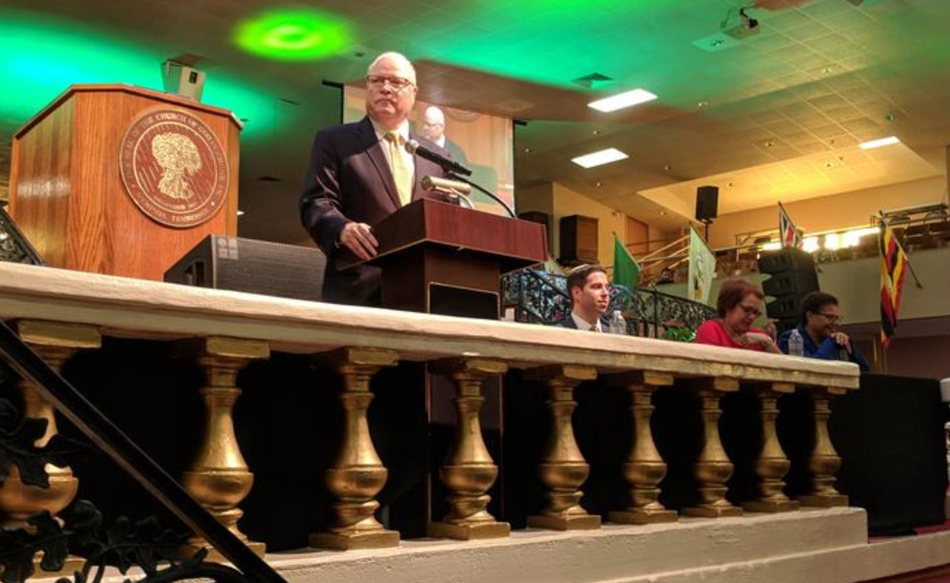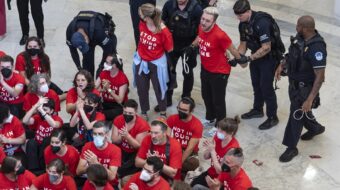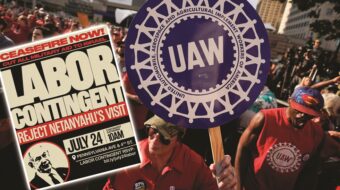
MEMPHIS, Tenn.—Politics and coalition-building, especially between the labor, civil rights and faith communities, took center stage at the second session of the I Am A Man 2018 commemoration of Dr. Martin Luther King’s life, courage and commitments, in Memphis, Tenn.
A parade of union leaders, plus the Rev. Jesse Jackson, urged the packed crowd to get involved, go door to door, unite around specific causes, and to marshal people to register and vote this November.
The object, they said, is to elect pro-worker progressive lawmakers and governors, at the state and federal levels, to turn back the forces of reaction scheming to destroy worker rights, civil rights and constitutional rights – forces led by Republican President Donald Trump.
Dr. King made the linkage between labor, faith, civil rights and politics, speakers said. His heirs must do so, too, they told the crowd on April 3.
“I was here that night in the balcony” at the historic Church of God in Christ, on April 3, 1968, when Dr. King gave his historic “Mountaintop Speech” the night before his assassination, said Cleo Smith, then aged 24. King ended that oration by saying he “may not be with you all” when people reach the promised land, “but we will get to see the Promised Land.
“We are in the promised land, but we as a people are going to have to stick together – and work together – to make this land better and be the promised land,” Smith said.
It’s absolutely necessary, warned Doug Moore, executive director of the State, County and Municipal Employees’ (AFSCME) United Domestic Workers Local 3930 of Los Angeles. “We still have structural racism that is so pervasive and insidious that it threatens everything we stand for” as a nation, Moore explained. AFSCME hosted and organized the 3-day commemoration and conference.
The unionists’ calls drew enthusiastic responses from the overflowing group at the historic Church of God in Christ, including hundreds of AFSCME members, dozens of Teachers and Service Employees, hundreds of Unite Here members and several dozen Government Employees (AFGE) members.
The unions, particularly those whose leaders took the stage – AFSCME President Lee Saunders, Unite Here Vice President Maria Elena Durazo, Service Employees President Mary Kay Henry and Teachers President Randi Weingarten – face an existential threat from the forces of reaction who also opposed Dr. King’s crusade for civil rights, speakers said.
That threat is not just in electoral politics, but in a looming U.S. Supreme Court ruling, the Janus case, that Saunders said could threaten every worker in the country, public and private, union and non-union.
The GOP-named 5-man court majority is expected to rule against unions in Janus, making every one of the nation’s 6.24 million state and federal government workers a potential “free rider,” able to use union services without paying one red cent for them. The ruling would deprive workers and unions of dollars, members and ability to advocate for workers’ interests.
Other unions also warn that once the justices emasculate public-worker unions, corporations, Congress and the courts could then move on to complete destruction of private-sector unions. Federal calculations show 14.8 million workers (10.7 percent) are union members, including 34.4 percent of all public workers and 6.5 percent of private-sector workers. AFSCME, the Teachers and SEIU are not only public-sector unions, but majority-minority.
There’s also a need for unity to lift up downtrodden workers, communities of color, women and others who suffer exploitation by corporate interests. Without unity and political mobilization, “we remain invisible” to the exploiters, Durazo said. With such unity and power “we got the first living wage ordinance in the country” in Los Angeles, her home, as an example.
Jackson used Memphis itself as a case study, saying the city is “:63 percent African-American, 32 percent of its residents live in poverty and 44 percent of its youth are unemployed. Half of its workers make less than $10 an hour and its Chamber of Commerce website advertises ‘Come to Memphis for abundant cheap labor.’”
“Fifty years later” – since King was murdered April 4, 1968 – “it’s the poorest big city in America. We have come here for a demonstration against poverty,” Jackson declared. Poverty is not just an economic problem “but a moral problem,” said Service Employees President Henry.
Progress on that issue, and others, including battling so-called “right to work” laws, will be achieved through politics, the union leaders said. One video between lineups of speakers showed former Democratic President Barack Obama saying “These right to work laws aren’t giving you the right to work. They’re giving you the right to work for less.”
“To engage the political system, you have to engage with emotion and commitment and power,” explained Teachers (AFT) President Randi Weingarten, a New York City middle school civics teacher. “Our weapon is our vote.”
That includes involving the teenagers, especially those leading the crusade for tougher gun controls, she said. The nation’s two teachers unions, AFT and the National Education Association, strongly support that crusade. So do the School Administrators and so, in his speech, did AFSCME President Saunders.
Mei-Ling Ho Shing, a teenaged survivor from Marjory Stoneman Douglas High School in Parkland, Fla. — where a gunman with an AR-15 massacred 14 students, two AFT-member teachers and the school’s athletic director on Valentine’s Day — preceded Weingarten to the podium. Shing linked civil rights to students’ rights – the right to be free of gun violence.
“Mei Ling represents so many of our hopes and dreams. Her voice cannot be stilled by the NRA (the National Rifle Association) or anyone else. She follows in the steps of the brave sanitation workers” of Memphis, said Weingarten. The sanitation workers’ 65-day strike for the right to unionize and for economic and workplace justice drew Dr. King to Memphis.
Students like Mei Ling and in the Black Lives Matter movement, along with teachers in West Virginia, Arizona, Oklahoma and Kentucky, “show the era of passivity is over,” Weingarten said.
“This requires a big table, with unions, the faith community and activists all at it,” Saunders said. Strong labor-clergy ties were “the hallmark” of Dr. King’s campaign for the sanitation workers in 1968 and must be the hallmark today, he stated.
“We’ve got a job to do, standing together, organizing, mobilizing and educating our communities, house by house, block by block, street by street. The struggle will continue and it will always continue…We must have a call to action in Cleveland, in New York, in Miami, in Chicago and in Los Angeles, every single day.”
Labor can also “bring all these movements together to go to the polls, added Rep. Karen Bass, D-Calif. They all must do so, she warned “because 45” – Trump’s number in the presidential lineup – “is an existential threat to ourselves, our community and our planet.”
“I’m confident that January 2019 will be the beginning of the end of 45’s reign of terror,” Bass concluded, implicitly predicting a Democratic takeover of at least one house of Congress.
Independent analysts say the Democrats have a decent chance, right now, of winning the 24 added seats they need to take over the U.S. House. Republicans hold 51 of the 100 Senate seats, but Democrats must defend 26 of their 47 this fall, including 10 in states Trump won in 2016.
Jackson concluded with the same political theme. “Today, there are four million blacks unregistered to vote in the South, two and half million registered who did not vote” in 2016 “and one and a half million high school seniors. If we register and vote, we can put in our own ‘trump card’ and retire ‘fake news,’” he said.
“Let’s get the job done,” Saunders said.












Comments